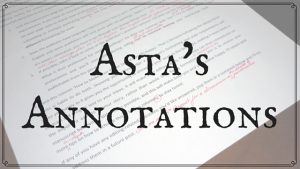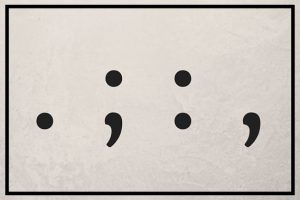
Anyone who knows me well will know semicolons are punctuation marks about which my views are passionate. Unfortunately, many digital/small publishing houses do not appear to agree. Notes from editors frequently come through to me with requests to remove all (or at least some) of my semicolons since they are ‘specialised punctuation’. My response to this (in my head) is to ask: Since when?
Now, this column is by no means intended as a rant against any publishers or fellow editors; I merely use it to illustrate a point. I fully accept that each publishing house has its own preferences, and that I and other authors must follow those preferences if we wish to publish our works with them. Most times my editor and I can find a middle ground, and I mourn the loss of my stricken semicolons and move on. However, it does raise the question of why this apparent terror of any punctuation marks other than commas and full stops has arisen, and that is what I thought it would be interesting to discuss today.
The digital revolution has brought about many wonderful things, including opening the world of book publishing to independent authors and small presses. It does appear, nonetheless, also to have ushered in a certain idleness when it comes to reading habits, and both punctuation and point of view suffer its effects.
Once, third person omniscient was an accepted point of view. Now, even if done correctly, many reviewers will give such works bad reviews, declaring the piece to be badly written and/or edited because of all the ‘head hopping’. Indeed, some publishers will not accept stories written in this POV at all.

Likewise, we have the aforementioned distaste for semicolons and colons. I could understand removing them if they are too prevalent (a modern editor would have a heart attack working with someone like Dickens!) or used incorrectly. Why, though, must we remove them if the author has them correctly placed and has not overused them? Does this boil down to a desire on the part of the reader to read without needing to think?
I have heard it said that these days we must simplify our prose for the sake of eBook readers, who need sentences to be short and easy, or else they cannot follow them. To me, this seems an odd argument. I read both print books and eBooks, but the way I read a sentence does not change between the two. It makes me query whether not all readers understand punctuation marks like the semicolon. Is this, then, a fault of education systems? In an age where speed is all that matters, are readers no longer willing to take the time to concentrate on a book where they must keep track of POV and follow longer, more complex sentence structures? Will we reach a point where commas, full stops, and em dashes become the only punctuation and first person or third person limited the only POVs, with everything else consigned to the garbage heap?
What do all the Queer Sci-Fiers out there think? Have any of you noticed the points I’ve raised? Do you agree or disagree? Have you any other theories that explain these recent changes? I would love to hear everyone else’s views on a topic that is close to my heart, and I look forward to reading any comments from both readers and fellow authors. Meanwhile, I will be back next month with a new edition of Asta’s Annotations in which I’ll share some editing tips aimed particularly at Sci-Fi and Fantasy writers.



